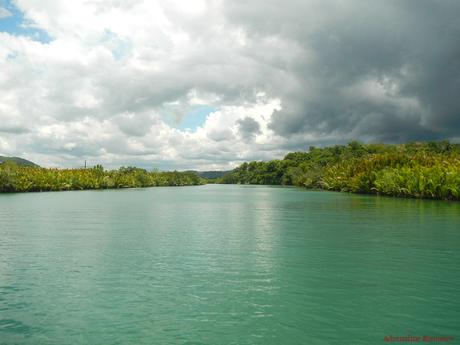
Is there anything more satisfying than having a sumptuous traditional Filipino lunch to satisfy a grumbling stomach after an entire morning of road tripping? It turns out that there actually is! Imagine eating delicious classic Filipino viands and sweet tropical fruits while cruising slowly down a pristine, scenic river. All the while, you are serenaded by an eclectic blend of folk and pop songs!
Well, you can have that unique experience in the quiet municipality of Loay, Bohol. With just a few hundred pesos, you can enjoy more than just a tasty lunch!
After learning how calamay is made and buying some pasalubongs at the Albur Calamay Manufacturing plant, we headed down to Loay River to take our lunch. We arrived at the staging point at around 9:30 AM, a tad too early for lunch.
So, we decided to check out the place first. Adjacent to the parking area is a souvenir shop where you can get more pasalubongs and trinkets.
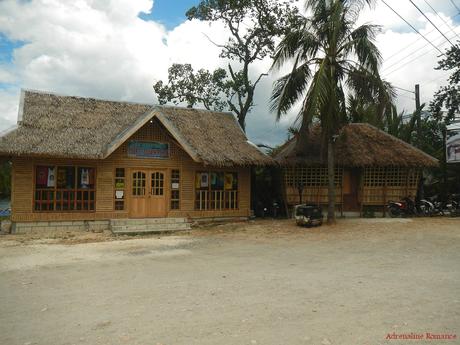
Loay River, as we learned, is a misnomer. The river is actually part of Loboc River and not a separate waterway. Loay is the name of a municipality of Bohol.
A low truss bridge connects the river banks to each other.
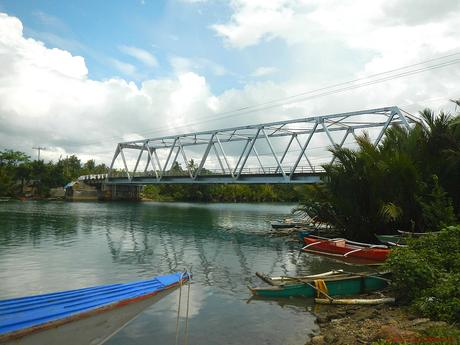
The starting point of the tour is right at the Loboc River’s mouth. Thus, it is not surprising that we found a colorful fishing boats of all sizes docked to both river banks. Larger fishing trawlers are also docked there; these vessels can stay in the open sea for weeks at a time to acquire a bigger catch.
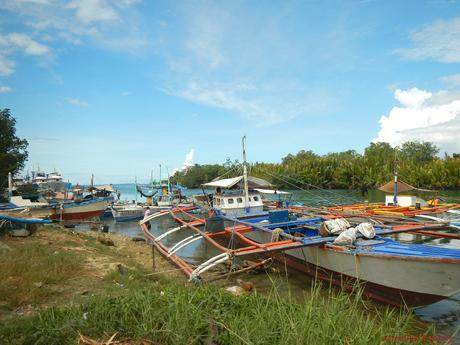
At present, the sole operator of the river cruise is Rio Verde Floating Resto. In the coming years, we believe that there will be more operators coming, which will result in a healthy competition.
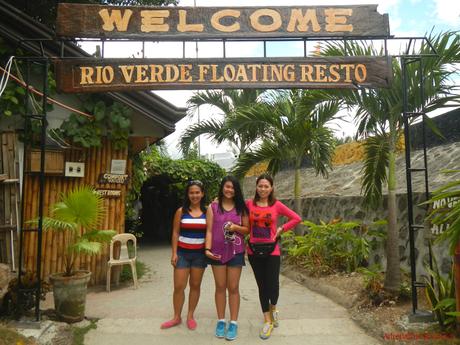
Even though lunch was not yet ready (and we were the very first customers of the day) and the business is still closed for the day, Rio Verde’s staff allowed us to pay ahead of time. Great! We don’t have to line up.
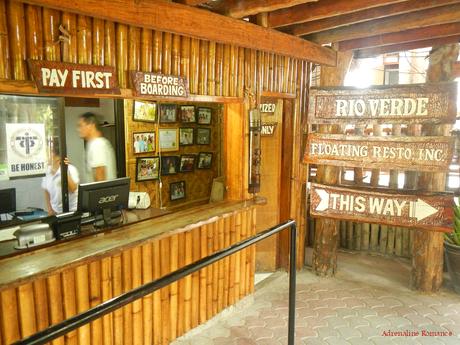
While waiting for boarding time, the ladies had fun taking souvenir photos. Polished bamboo chairs and benches are available for the guests’ comfort.
I was getting a little bit bored when I heard a familiar sound at the security outpost above the waiting area. It turned out that an off-duty security guy was watching one of my favorite shows. So, I slithered away from the girls and watched Behind Enemy Lines with the off-duty guard. Hehehe!
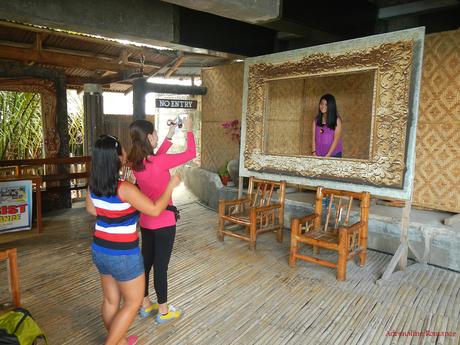
Great timing! As soon as Behind Enemy Lines was finished, Sheila called me to announce that it was time to board. Whoopee, because we’re getting hungry! Hehehe!
We walked down this gangplank to board our large lunch barge, which can accommodate about 50 to 60 people.
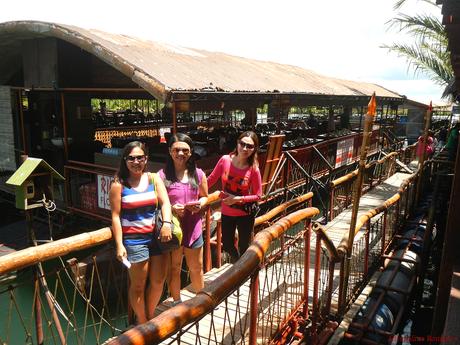
The Pawikan barges are so-named due to their roofs which are made to resemble pawikans (sea turtles). There are more varieties of dishes served for those who avail of the menu in Pawikan barges.
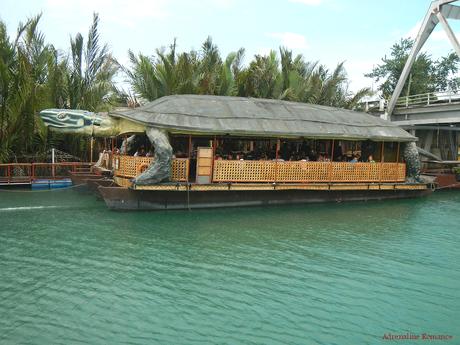
Smaller barges are for private parties such as families, group of friends, or colleagues. They need to be reserved in advance.
These barges are designed to resemble coconut shells that contain calamay, one of Bohol’s most tasty delicacies.
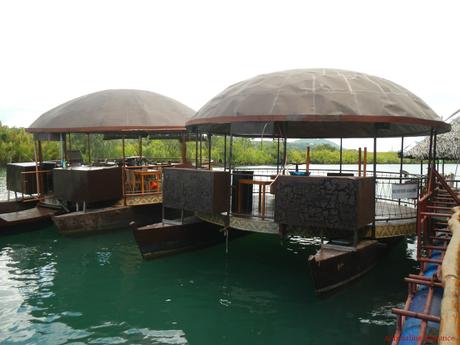
Each barge is pushed by a small slow boat with an intentionally under-powered engine for a slow, smooth ride.
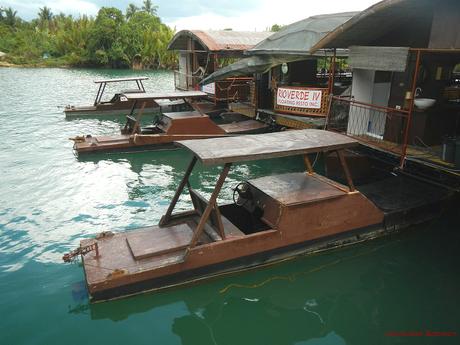
Since we were among the first to board the barge, we had the opportunity to take first dibs on food. All meals are served in covered trays or under cling wraps to prevent flies from landing on the food.
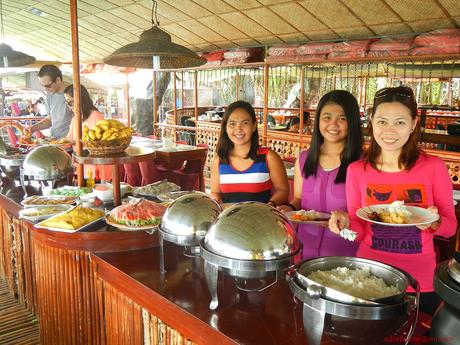
Most of the meals being served are traditional Filipino viands such as calamares (slices of squid dipped in batter and deep fried), barbecue, fried chicken, and more. Foreigners who want to have a taste of Filipino food while enjoying a relaxing country scene are encouraged to check out this floating resto.
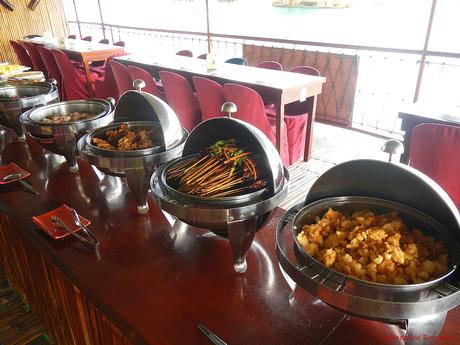
This is one of my favorites—delectable baby squid being sauteed in a spicy concoction of garlic, peppers, onions, and broth.

That is hot, freshly boiled ginataan langka—chunks of jack fruit boiled in coconut milk and garnished with black beans, lemongrass, and other spices. Yummy!
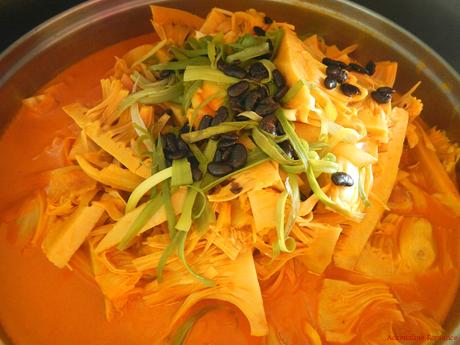
We waited for about half an hour for other people to fill up the barge. Thereafter, the engine rumbled to life and settled down on a steady mutter. The lines were cast off, and we started sailing on the calm, majestic Loboc River.
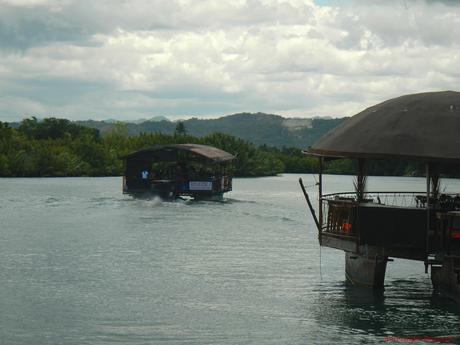
What a gorgeous, verdant river! Each side is teeming with mangroves, sea palms, and other river-borne vegetation. The unspoiled greenery meant one thing; there is a very healthy ecosystem that is preserved in this part of Loboc River.
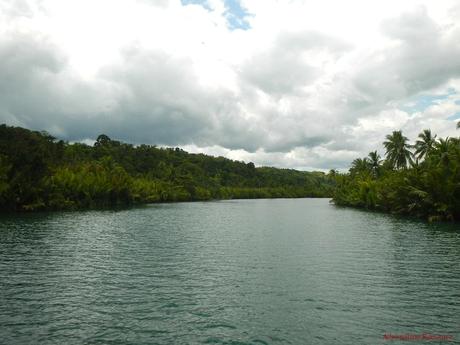
In some parts of the river, we saw soft limestone cliffs being slowly revealed as rainwater washes away the layer of topsoil.
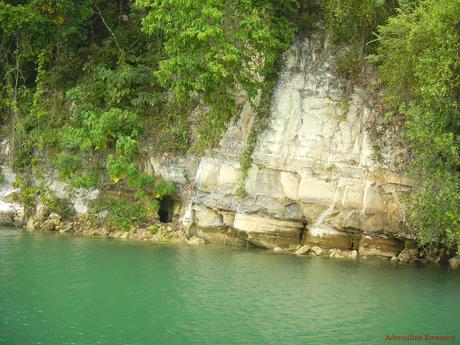
Floating resto barges are not the only vessels plying along Loboc River. Humble families of fishermen ride their small outrigger boats in search for fish. Considering how the prsitine waterway and the surrounding virgin mangroves are well taken cared of, it should come to no surprise to realize that the river has a rich bounty of fish.
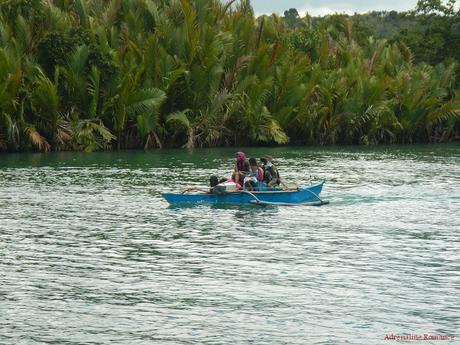
How about some great live music while you eat your lunch? This old local plays novelty tunes, folk songs, and foreign oldies to keep guests entertained. He even sang a Korean love song when he spotted a few Koreans in the barge.
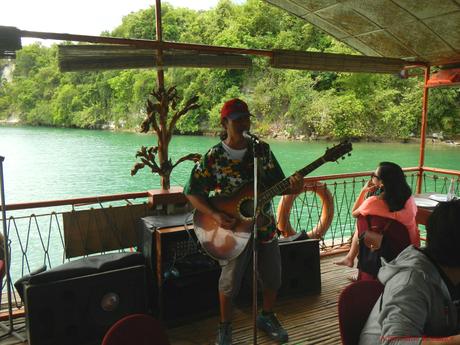
There’s nothing more relaxing than eating a sumptuous mid-day meal while slowly cruising down a clean, calm river—all the while being serenaded by an expert local musician.
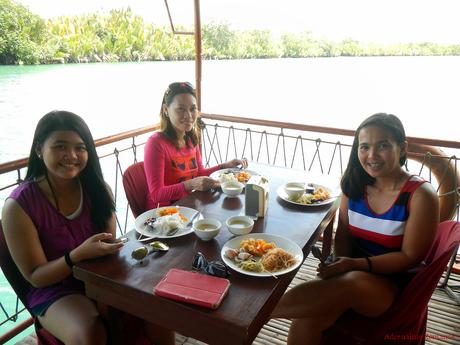
We were not alone who enjoyed this experience. Foreign and local guests ate with audible gusto while totally immersing in the rejuvenating experience.
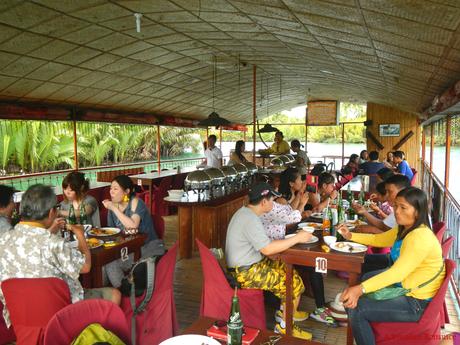
We were so delightfully full that it seemed that we’re going to burst if we have to devour another bite. But we just couldn’t resist eating a healthy serving of these juicy tropical fruits and luscious Filipino desserts.
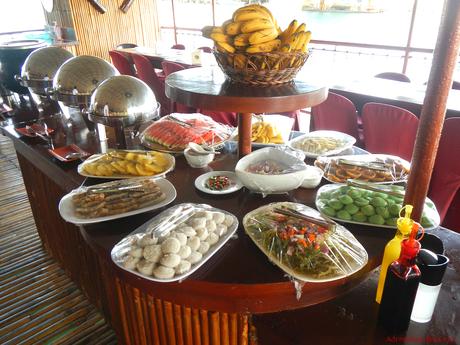
A few miles away from the jump-off, our barge slowly steered left from the center of the river to this tree-covered village of some sort. Is the tour supposed to end here? We hope not since it’s a long way back to the jump-off point.
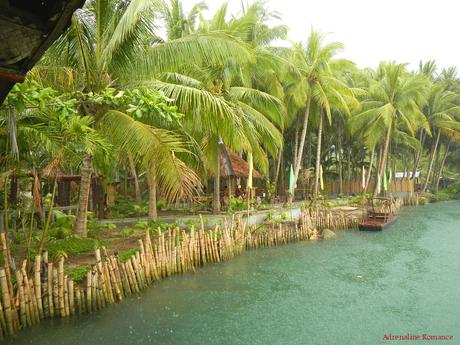
It turned out that this is a faithful replica of a village that belongs to the Ati Tribe, a local tribe that makes this river their home. The caretakers of this stopover are genuine Ati people. Although they have been exposed and adapted to modern society, this replica village allows us to have a glimpse into the past.
The LGU and the regional tourism department has purposely set up this Ati Village to promote Bohol’s cultural heritage and to provide financial assistance to the Ati tribe.
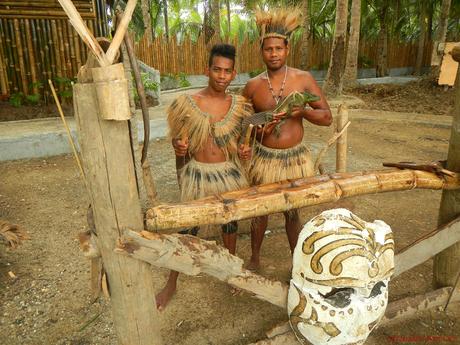
Replicas of Ati huts are constructed on the village. We would have went in, but it was raining heavily.
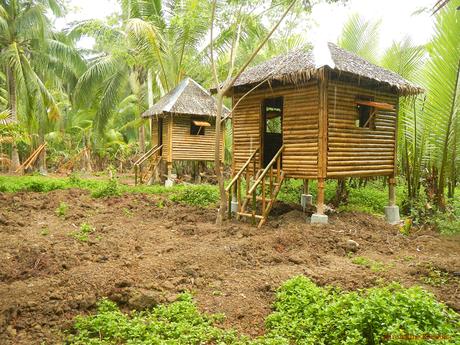
When we approached the Ati village, we heard a tribal, rhythmic beat that, for some reason, made us unconsciously tap our feet. Well, it came from these large drums.
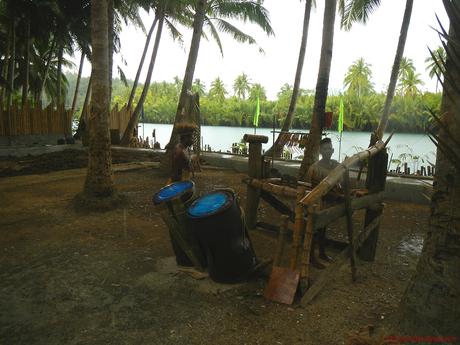
Thirsty? Tired of water or soft drinks? No worries, the Ati tribe sells fresh coconut juice to quench your thirst. Don’t you know that buko juice contains a rich quantity of electrolytes and mineral salts? Yes, coconut water is dubbed as Mother Nature’s energy drink!
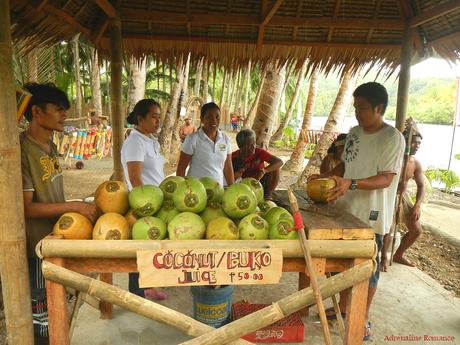
Before you leave the Ati village, do buy one of these bow-arrow-and-quiver set as a souvenir. Your purchase would definitely help the Atis in their daily expenditures.
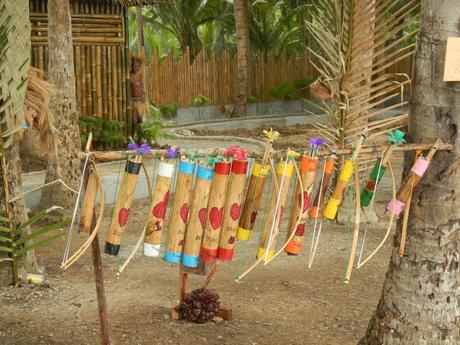
After spending half an hour in the replica village, we re-boarded the barge. We found out that the Ati village was the last point of this tour, and the barge made a U-turn to head back to port.
Check out those green mangroves with the palm leaves.
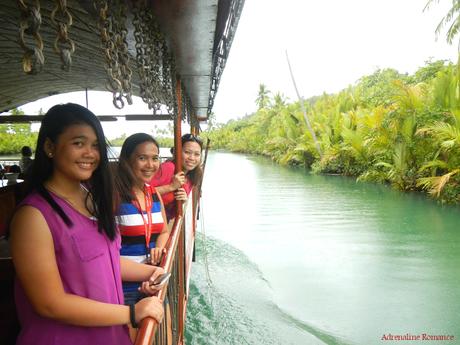
After a while, we saw the Loay bridge in the distance. We had a filling lunch and a relaxing cruise, which refilled our depleted energy stores so we can be ready for the next leg of our weekend adventure!
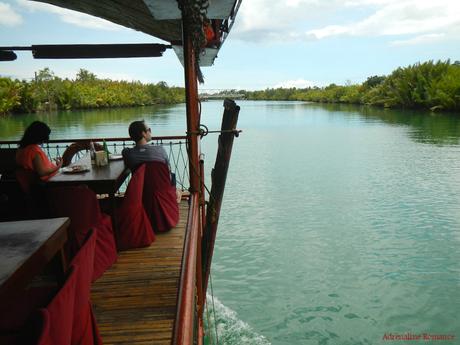
Our verdict? Taking your a buffet lunch in the Rio Verde Floating Resto along the Loboc River is an experience that you should not miss. The traditional Filipino food is so-so but filling; we have eaten better Filipino meals elsewhere. But the feeling of serenity as you cruise along a clean river, looking at blue mountains in the distance, while taking lunch is something extraordinary. The live music entertainment is a welcome addition, and a visit to the Ati Village caps the adventure.
In other words, you get more than just a hearty lunch!
Tips
1. The river cruise in Loay is a suitable alternative if the more popular Loboc River Cruise is full. The sole operator of the Loay cruise is Rio Verde Floating Resto. Please find their contact details below.
- Address: Poblacion Loay Bridge, Loay, Bohol
- Phone Number: (038) 538-9196 / (038) 501-8895
- Mobile Number: 092-13379076 / 0917-3242573
- Email: [email protected] / [email protected]
- Facebook Page: Rio Verde Floating Resto
- Website: Rio Verde Floating Resto
They start accepting payments at 10 AM, but the actual boarding time is around 10:30 to 11 AM.
2. Below are the buffet rates*:
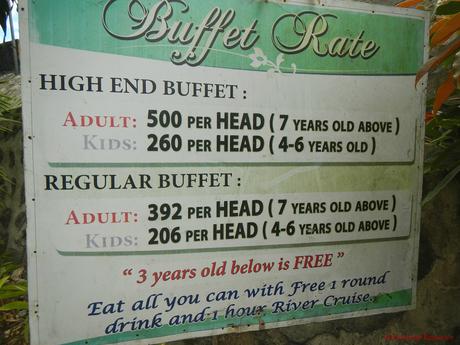
3. Here’s the regular menu*:
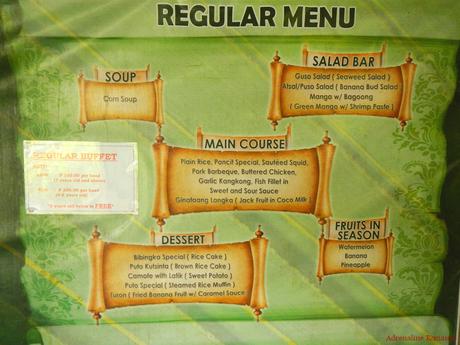
And here’s the high-end menu*:
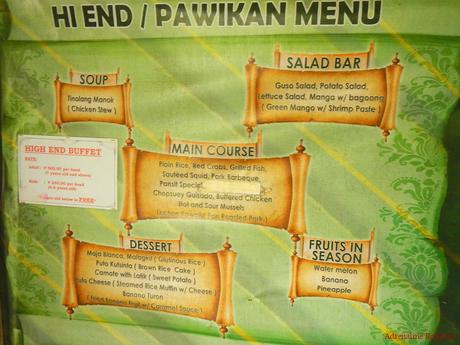
*Note that rates and menu items may change without prior notice. Contact Rio Verde Floating Resto for updated details.
4. To enjoy the cruise, we suggest you take your lunch as soon as you board the barge. It takes around 30 minutes or more for the barge to fill up, so that will give you enough time to fill your tummy up. Once the cruise starts, the meal is out of the way, and you can focus more on the river.
5. Observe LNT principles. Do not throw your trash in the river.

